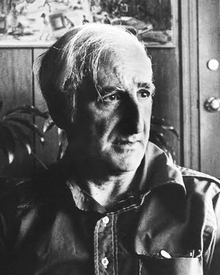
Back بن باغديكيان Arabic بين باجديكيان ARZ Ben Bagdikian Spanish بن باغدیکیان Persian Ben Bagdikian Croatian Բեն Բաղդիկյան Armenian Պեն Պաղտիկեան HYW ბენ ბაგდიკიანი Georgian Багдикян, Бен Russian Бен Багдикян Ukrainian
Ben Bagdikian | |
|---|---|
 Bagdikian in 1976 | |
| Born | Ben-Hur Haig Bagdikian January 30, 1920 Marash, Aleppo vilayet, Ottoman Empire |
| Died | March 11, 2016 (aged 96) Berkeley, California, U.S. |
| Nationality | American |
| Alma mater | Clark University |
| Occupations |
|
| Years active | 1947–1990 |
| Military career | |
| Allegiance | |
| Service | |
| Years of service | 1942−1946[1] |
| Rank | |
Ben-hur Haig Bagdikian[2] (January 30, 1920 – March 11, 2016) was an American journalist, news media critic and commentator,[3] and university professor. An Armenian genocide survivor, he moved to the United States as an infant and began a journalism career after serving in World War II. He worked as a local reporter, investigative journalist and foreign correspondent for The Providence Journal. During his time there, Bagdikian won a Peabody Award and a Pulitzer Prize. In 1971, he received parts of the Pentagon Papers from Daniel Ellsberg and successfully persuaded The Washington Post to publish them despite objections and threats from the Richard Nixon administration. He later taught at the University of California, Berkeley Graduate School of Journalism and served as its dean from 1985 to 1988.
Bagdikian was a critic of the news media.[4] His 1983 book The Media Monopoly, warning about the growing concentration of corporate ownership of news organizations, went through several editions and influenced, among others, Noam Chomsky. He has been hailed for his ethical standards and has been described by Robert W. McChesney as one of the finest journalists of the 20th century.
- ^ Cite error: The named reference
agbuwas invoked but never defined (see the help page). - ^ Taft, William H. (2016). Encyclopedia of Twentieth Century Journalists. Routledge. p. 19. ISBN 9781317403258.
- ^ Collins, Glenn (21 February 1989). "Variety's New Look for New Readers". The New York Times.
Ben Bagdikian, the media commentator...
- ^ Rubens 2011, p. ix.